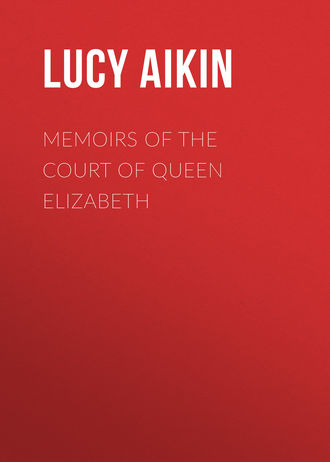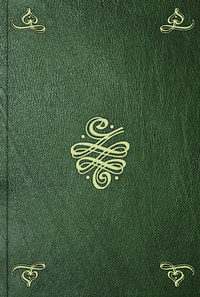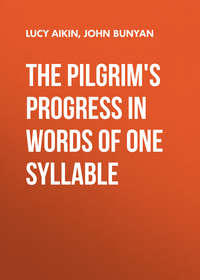 полная версия
полная версияMemoirs of the Court of Queen Elizabeth
The epistles from which the extracts in the preceding pages are with some abridgement translated, and which are said to be the first collection of private letters ever published by any Englishman, were all written during the year 1550, when Ascham, on some disgust, had quitted the court and returned to his situation of Greek reader at Cambridge; and perhaps the eulogiums here bestowed, in epistles which his correspondent lost no time in committing to the press, were not composed without the secret hope of their procuring for him a restoration to that court life which it seems difficult even for the learned to quit without a sigh. It would be unjust, however, to regard Ascham in the light of a flatterer; for his praises are in most points corroborated by the evidence of history, or by other concurring testimonies. His observations, for instance, on the modest simplicity of Elizabeth's dress and appearance at this early period of her life, which might be received with some incredulity by the reader to whom instances are familiar of her inordinate love of dress at a much more advanced age, and when the cares of a sovereign ought to have left no room for a vanity so puerile, receive strong confirmation from another and very respectable authority.
Dr. Elmer or Aylmer, who was tutor to lady Jane Grey and her sisters, and became afterwards, during Elizabeth's reign, bishop of London, thus draws her character when young, in a work entitled "A Harbour for faithful Subjects." "The king left her rich cloaths and jewels; and I know it to be true, that in seven years after her father's death, she never in all that time looked upon that rich attire and precious jewels but once, and that against her will. And that there never came gold or stone upon her head, till her sister forced her to lay off her former soberness, and bear her company in her glittering gayness. And then she so wore it, as every man might see that her body carried that which her heart misliked. I am sure that her maidenly apparel which she used in king Edward's time, made the noblemen's daughters and wives to be ashamed to be dressed and painted like peacocks; being more moved with her most virtuous example than with all that ever Paul or Peter wrote touching that matter. Yea, this I know, that a great man's daughter (lady Jane Grey) receiving from lady Mary before she was queen good apparel of tinsel, cloth of gold and velvet, laid on with parchment lace of gold, when she saw it, said, 'What shall I do with it?' 'Mary,' said a gentlewoman, 'wear it.' 'Nay,' quoth she, 'that were a shame, to follow my lady Mary against God's word, and leave my lady Elizabeth which followeth God's word.' And when all the ladies at the coming of the Scots queen dowager, Mary of Guise, (she who visited England in Edward's time,) went with their hair frownsed, curled, and doublecurled, she altered nothing but kept her old maidenly shamefacedness." This extract may be regarded as particularly curious, as an exemplification of the rigid turn of sentiment which prevailed at the court of young Edward, and of the degree in which Elizabeth conformed herself to it. There is a print from a portrait of her when young, in which the hair is without a single ornament and the whole dress remarkably simple.
But to return to Ascham.—The qualifications of this learned man as a writer of classical Latin recommended him to queen Mary, notwithstanding his known attachment to the protestant faith, in the capacity of Latin secretary; and it was in the year 1555, while holding this station, that he resumed his lessons to his illustrious pupil.
"The lady Elizabeth and I," writes he to Sturmius, "are reading together in Greek the Orations of Æschines and Demosthenes. She reads before me, and at first sight she so learnedly comprehends not only the idiom of the language and the meaning of the orator, but the whole grounds of contention, the decrees of the people, and the customs and manners of the Athenians, as you would greatly wonder to hear."
Under the reign of Elizabeth, Ascham retained his post of Latin secretary, and was admitted to considerable intimacy by his royal mistress. Addressing Sturmius he says, "I received your last letters on the 15th of January 1560. Two passages in them, one relative to the Scotch affairs, the other on the marriage of the queen, induced me to give them to herself to read. She remarked and graciously acknowledged in both of them your respectful observance of her. Your judgement in the affairs of Scotland, as they then stood, she highly approved, and she loves you for your solicitude respecting us and our concerns. The part respecting her marriage she read over thrice, as I well remember, and with somewhat of a gentle smile; but still preserving a modest and bashful silence.
"Concerning that point indeed, my Sturmius, I have nothing certain to write to you, nor does any one truly know what to judge. I told you rightly, in one of my former letters, that in the whole ordinance of her life she resembled not Phædra but Hippolyta; for by nature, and not by the counsels of others, she is thus averse and abstinent from marriage. When I know any thing for certain, I will write it to you as soon as possible; in the mean time I have no hopes to give you respecting the king of Sweden."
In the same letter, after enlarging, somewhat too rhetorically perhaps, on the praises of the queen and her government, Ascham recurs to his favorite theme,—her learning; and roundly asserts, that there were not four men in England, distinguished either in the church or the state, who understood more Greek than her majesty: and as an instance of her proficiency in other tongues, he mentions that he was once present at court when she gave answers at the same time to three ambassadors, the Imperial, the French, and the Swedish, in Italian, in French, and in Latin; and all this, fluently, without confusion, and to the purpose.
A short epistle from queen Elizabeth to Sturmius, which is inserted in this collection, appears to refer to that of Sturmius which Ascham answers above. She addresses him as her beloved friend, expresses in the handsomest terms her sense of the attachment towards herself and her country evinced by so eminent a cultivator of genuine learning and true religion, and promises that her acknowledgements shall not be confined to words alone; but for a further explanation of her intentions she refers him to the bearer; consequently we have no data for estimating the actual pe cuniary value of these warm expressions of royal favor and friendship. But we have good proof, unfortunately, that no munificent act of Elizabeth's ever interposed to rescue her zealous and admiring preceptor from the embarrassments into which he was plunged, probably indeed by his own imprudent habits, but certainly by no faults which ought to have deprived him of his just claims on the purse of a mistress whom, he had served with so much ability, and with such distinguished advantage to herself. The other learned females of this age whom Ascham has complimented by addressing them in Latin epistles, are, Anne countess of Pembroke, sister of queen Catherine Parr; a young lady of the name of Vaughan; Jane Grey; and Mrs. Clark, a grand-daughter of sir Thomas More, by his favorite daughter Mrs. Roper. In his letter to this last lady, written during the reign of Mary, after congratulating her on her cultivation, amid the luxury and dissipation of a court, of studies worthy the descendant of a man whose high qualities had ennobled England in the estimation of foreign nations, he proceeds to mention, that he is the person whom, several years ago, her excellent mother had requested to undertake the instruction of all her children in Greek and Latin literature. At that time, he says, no offer could tempt him to quit his learned retirement at Cambridge, and he was reluctantly compelled to decline the proposal; but being now once more established at court, he freely offers to a lady whose accomplishments he so much admires, any assistance in her laudable pursuits which it may be in his power to afford.
A few more scattered notices may be collected relative to this period of the life of Elizabeth. Her talents, her vivacity, her proficiency in those classical studies to which he was himself addicted, and especially the attachment which she manifested to the reformed religion, endeared her exceedingly to the young king her brother, who was wont to call her,—perhaps with reference to the sobriety of dress and manners by which she was then distinguished,—his sweet sister Temperance. On her part his affection was met by every demonstration of sisterly tenderness, joined to those delicate attentions and respectful observances which his rank required.
It was probably about 1550 that she addressed to him the following letter on his having desired her picture, which affords perhaps the most favorable specimen extant of her youthful style.
"Like as the rich man that daily gathereth riches to riches, and to one bag of money layeth a great sort till it come to infinite: so methinks your majesty, not being sufficed with so many benefits and gentleness shewed to me afore this time, doth now increase them in asking and desiring where you may bid and command; requiring a thing not worthy the desiring for itself, but made worthy for your highness' request. My picture I mean: in which, if the inward good mind toward your grace might as well be declared, as the outward face and countenance shall be seen, I would not have tarried the commandment but prevented it, nor have been the last to grant but the first to offer it. For the face I grant I might well blush to offer, but the mind I shall never be ashamed to present. But though from the grace of the picture the colors may fade by time, may give by weather, may be spited by chance; yet the other, nor time with her swift wings shall overtake, nor the misty clouds with their lowering may darken, nor chance with her slippery foot may overthrow.
"Of this also yet the proof could not be great, because the occasions have been so small; notwithstanding, as a dog hath a day, so may I perchance have time to declare it in deeds, which now I do write them but in words. And further, I shall humbly beseech your majesty, that when you shall look on my picture, you will witsafe to think, that as you have but the outward shadow of the body afore you, so my inward mind wisheth that the body itself were oftener in your presence. Howbeit because both my so being I think could do your majesty little pleasure, though myself great good; and again, because I see not as yet the time agreeing thereunto, I shall learn to follow this saying of Horace, 'Feras, non culpes, quod vitari non potest.' And thus I will (troubling your majesty I fear) end with my most humble thanks; beseeching God long to preserve you to his honor, to your comfort, to the realms profit, and to my joy.
(From Hatfield this 15th day of May.)
Your majesty's most humble sister and servant
Elizabeth."An exact memorialist14 has preserved an instance of the high consideration now enjoyed by Elizabeth in the following passage, which is further curious as an instance of the state which she already assumed in her public appearances. "March 17th (1551). The lady Elizabeth, the king's sister, rode through London unto St. James's, the king's palace, with a great company of lords, knights, and gentlemen; and after her a great company of ladies and gentlemen on horseback, about two hundred. On the 19th she came from St. James's through the park to the court; the way from the park gate unto the court spread with fine sand. She was attended with a very honorable confluence of noble and worshipful persons of both sexes, and received with much ceremony at the court gate."
The ensuing letter, however, seems to intimate that there were those about the young king who envied her these tokens of favor and credit, and were sometimes but too successful in estranging her from the royal presence, and perhaps in exciting prejudices against her:—It is unfortunately without date of year.
"The princess Elizabeth to king Edward VI.
"Like as a shipman in stormy weather plucks down the sails tarrying for better wind, so did I, most noble king, in my unfortunate chance a Thursday pluck down the high sails of my joy and comfort; and do trust one day, that as troublesome waves have repulsed me backward, so a gentle wind will bring me forward to my haven. Two chief occasions moved me much and grieved me greatly: the one, for that I doubted your majesty's health; the other, because for all my long tarrying, I went without that I came for. Of the first I am relieved in a part, both that I understood of your health, and also that your majesty's lodging is far from my lord marques' chamber: of my other grief I am not eased; but the best is, that whatsoever other folks will suspect, I intend not to fear your grace's good will, which as I know that I never deserved to faint, so I trust will still stick by me. For if your grace's advice that I should return, (whose will is a commandment) had not been, I would not have made the half of my way the end of my journey.
"And thus as one desirous to hear of your majesty's health, though unfortunate to see it, I shall pray God to preserve you. (From Hatfield this present Saturday.)
"Your majesty's humble sister to commandment,
"Elizabeth."CHAPTER V
1549 TO 1553Decline of the protector's authority.—He is imprisoned—accused of misdemeanors—loses his office—is liberated—reconciled with Dudley, who succeeds to his authority.—Dudley pushes on the reformation.—The celebration of mass prohibited.—Princess Mary persecuted.—The emperor attempts to get her out of the kingdom, but without success—interferes openly in her behalf.—Effect of persecution on the mind of Mary.—Marriage proposed for Elizabeth with the prince of Denmark.—She declines it.—King betrothed to a princess of France.—Sweating sickness.—Death of the duke of Suffolk.—Dudley procures that title for the marquis of Dorset, and the dukedom of Northumberland for himself.—Particulars of the last earl of Northumberland.—Trial, conviction, and death of the duke of Somerset.—Christmas festivities of the young king.—Account of George Ferrers master of the king's pastimes, and his works.—Views of Northumberland.—Decline of the king's health.—Scheme of Northumberland for lady Jane Grey's succession.—Three marriages contrived by him for this purpose.—He procures a settlement of the crown on the lady Jane.—Subserviency of the council.—Death of Edward concealed by Northumberland.—The princesses narrowly escape falling into his hands.—Courageous conduct of Elizabeth.—Northumberland deserted by the council and the army.—Jane Grey imprisoned.—Northumberland arrested.—Mary mounts the throne.
It was to little purpose that the protector had stained his hands with the blood of his brother, for the exemption thus purchased from one kind of fear or danger, was attended by a degree of public odium which could not fail to render feeble and tottering an authority based, like his, on plain and open usurpation.
Other causes conspired to undermine his credit and prepare his overthrow. The hatred of the great nobles, which he augmented by a somewhat too ostentatious patronage of the lower classes against the rich and powerful, continually pursued and watched the opportunity to ruin him. Financial difficulties pressed upon him, occasioned in great measure by the wars with France and Scotland which he had carried on, in pursuance of Henry's design of compelling the Scotch to marry their young queen to his son. An object which had finally been frustrated, notwithstanding the vigilance of the English fleet, by the safe arrival of Mary in France, and her solemn betrothment to the dauphin. The great and glorious work of religious reformation, though followed by Somerset, under the guidance of Cranmer, with a moderation and prudence which reflect the highest honor on both, could not be brought to perfection without exciting the rancorous hostility of thousands, whom various motives and interests attached to the cause of ancient superstition; and the abolition, by authority, of the mass, and the destruction of images and crucifixes, had given birth to serious disturbances in different parts of the country. The want and oppression under which the lower orders groaned,—and which they attributed partly to the suppression of the monasteries to which they had been accustomed to resort for the supply of their necessities, partly to a general inclosure bill extremely cruel and arbitrary in its provisions,—excited commotions still more violent and alarming. In order to suppress the insurrection in Norfolk, headed by Kett, it had at length been found necessary to send thither a large body of troops under the earl of Warwick, who had acquired a very formidable degree of celebrity by the courage and conduct which he exhibited in bringing this difficult enterprise to a successful termination.
A party was now formed in the council, of which Warwick, Southampton, Arundel, and St. John, were the chiefs; and strong resolutions were entered into against the assumed authority of the protector. This unfortunate man, whom an inconsiderate ambition, fostered by circumstances favorable to its success, had pushed forward into a station equally above his talents and his birth, was now found destitute of all the resources of courage and genius which might yet have retrieved his authority and his credit. He suffered himself to be surprised into acts indicative of weakness and dismay, which soon robbed him of his remaining partisans, and gave to his enemies all the advantage which they desired.
His committal to the Tower on several charges, of which his assumption of the whole authority of the state was the principal, soon followed. A short time after he was deprived of his high office, which was nominally vested in six members of the council, but really in the earl of Warwick, whose private ambition seems to have been the main-spring of the whole intrigue, and who thus became, almost without a struggle, undisputed master of the king and kingdom.
That poorness of spirit which had sunk the duke of Somerset into insignificance, saved him at present from further mischief. In the beginning of the ensuing year, 1550, having on his knees confessed himself guilty of all the matters laid to his charge, without reservation or exception, and humbly submitted himself to the king's mercy, he was condemned in a heavy fine, on remission of which by the king he was liberated. Soon after, by the special favor of his royal nephew, he was readmitted into the council; and a reconciliation was mediated for him with Warwick, cemented by a marriage between one of his daughters and the son and heir of this aspiring leader.
The catholic party, which had flattered itself that the earl of Warwick, from gratitude for the support which some of its leaders had afforded him, and perhaps also from principle, no less than from opposition to the duke of Somerset, would be led to embrace its defence, was now destined to deplore its disappointment.
Determined to rule alone, he soon shook off his able but too aspiring colleague, the earl of Southampton, and disgraced, by the imposition of a fine for some alleged embezzlement of public money, the earl of Arundel, also a known assertor of the ancient faith, finally, having observed how closely the principles of protestantism, which Edward had derived from instructors equally learned and zealous, had interwoven themselves with the whole texture and fabric of his mind, he resolved to merit the lasting attachment of the royal minor by assisting him to complete the overthrow of popery in England.
A confession of faith was now drawn up by commissioners appointed for the purpose, and various alterations were made in the Liturgy, which had already been translated into the vulgar tongue for church use. Tests were imposed, which Gardiner, Bonner, and several others of the bishops felt themselves called upon by conscience, or a regard to their own reputation, to decline subscribing, even at the price of deprivation; and prodigious devastations were made by the courtiers on the property of the church. To perform or assist at the performance of the mass was also rendered highly penal. But no dread of legal animadversion was capable of deterring the lady Mary from the observance of this essential rite of her religion; and finding herself and her household exposed to serious inconveniences on account of their infraction of the new statute, she applied for protection to her potent kinsman the emperor Charles V., who is said to have undertaken her rescue by means which could scarcely have failed to involve him in a war with England. By his orders, or connivance, certain ships were prepared in the ports of Flanders, manned and armed for an attempt to carry off the princess either by stealth or open force, and land her at Antwerp. In furtherance of the design, several of her gentlemen had already taken their departure for that city, and Flemish light vessels were observed to keep watch on the English coast. But by these appearances the apprehensions of the council were awakened, and a sudden journey of the princess from Hunsdon in Hertfordshire towards Norfolk, for which she was unable to assign a satisfactory reason, served as strong confirmation of their suspicions.
A violent alarm was immediately sounded through the nation, of foreign invasion designed to co-operate with seditions at home; bodies of troops were dispatched to protect different points of the coast; and several ships of war were equipped for sea; while a communication on the subject was made by the council to the nobility throughout the kingdom, in terms calculated to awaken indignation against the persecuted princess, and all who were suspected, justly or unjustly, of regarding her cause with favor. A few extracts from this paper will exhibit the fierce and jealous spirit of that administration of which Dudley formed the soul.
"So it is, that the lady Mary, not many days past, removed from Newhall in Essex to her house of Hunsdon in Hertfordshire, the cause whereof, although we knew not, yet did we rather think it likely that her grace would have come to have seen his majesty; but now upon Tuesday last, she hath suddenly, without knowledge given either to us here or to the country there, and without any cause in the world by us to her given, taken her journey from Hunsdon towards Norfolk" &c. "This her doing we be sorry for, both for the evil opinion the king's majesty our master may conceive thereby of her, and for that by the same doth appear manifestly the malicious rancour of such as provoke her thus to breed and stir up, as much as in her and them lieth, occasion of disorder and unquiet in the realm" &c. "It is not unknown to us but some near about the said lady Mary have very lately in the night seasons had privy conferences with the emperor's embassador here being, which councils can no wise tend to the weal of the king's majesty our master or his realm, nor to the nobility of this realm. And whatsoever the lady Mary shall upon instigation of these forward practices further do, like to these her strange beginnings, we doubt not but your lordship will provide that her proceedings shall not move any disobedience or disorder—The effect whereof if her counsellors should procure, as it must be to her grace, and to all other good Englishmen therein seduced, damnable, so shall it be most hurtful to the good subjects of the country" &c.15
Thus did the fears, the policy, or the party-spirit, of the members of the council lead them to magnify the peril of the nation from the enterprises of a young and defenceless female, whose best friend was a foreign prince, whose person was completely within their power, and who, at this period of her life "more sinned against than sinning," was not even suspected of any other design than that of withdrawing herself from a country in which she was no longer allowed to worship God according to her conscience. Some slight tumults in Essex and Kent, in which she was not even charged with any participation, were speedily suppressed; and after some conference with the chancellor and secretary Petre, Mary obeyed a summons to attend them to the court, where she was now to be detained for greater security.
On her arrival she received a reprimand from the council for her obstinacy respecting the mass, with an injunction to instruct herself, by reading, in the grounds of protestant belief. To this she replied, with the inflexible resolution of her character, that as to protestant books, she thanked God that she never had read any, and never intended so to do; that for her religion she was ready to lay down her life, and only feared that she might not be found worthy to become its martyr. One of her chaplains was soon after thrown into prison; and further severities seemed to await her, when a message from the emperor, menacing the country with war in case she should be debarred from the free exercise of her religion, taught the council the expediency of relaxing a little the sternness of their intolerance. But the scruples of the zealous young king on this head could not be brought to yield to reasons of state, till he had "advised with the archbishop of Canterbury and the bishops of London and Rochester, who gave their opinion that to give license to sin was sin, but to connive at sin might be allowed in case it were neither long, nor without hope of reformation16."





